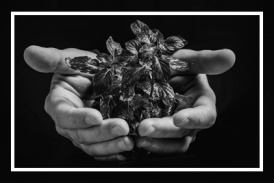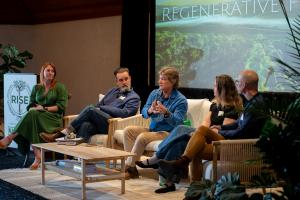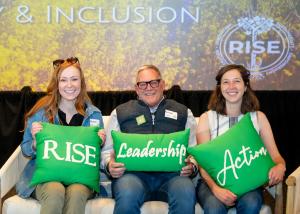The RISE Climate & Wine Symposium Engaged 650 Guests Sharing Leadership Opportunities & Generating Commitments to Action
The aim of RISE is to motivate and support a more regenerative & resilient wine community, and leverage wine’s powerful platform to show what is possible.
RISE established that regenerative agriculture is our future. Chimney Rock Winemaker Elizabeth Vianna, noted, “Biodiversity feels good. It feels right.” Dr. Jonathan Lundgren, Director of Ecdysis Foundation, said, “For every management decision you make you should ask yourself, ‘Am I killing life or am I growing life?’...Farmers are meant to be stewards of life.” Caine Thompson, Managing Director of Robert Hall, shared, “We’ve had a seven percent increase in farming costs, but that’s been more than offset by improved yields and higher quality fruit.” Bedrock Wine Co. owner Morgan Twain-Peterson MW, revealed, “Tilled soil can absorb water at a rate of roughly half an inch per hour. Non-tilled soil can absorb 8-11 inches of water per hour.” Tommy Fenster, PhD candidate at UC Davis, said, “Our research shows the benefits of stacking regenerative practices even without being organic.”
To help accelerate the regenerative movement Napa Green and Thompson, who is also a Regenerative Viticulture Foundation board member, committed to launch the One Block Challenge in the North Bay later this year.
Chris Renfro, founder of The Two Eighty Project, noted, “Wine has the potential to show what diversity can look like in a bottle.” Jermaine Stone, creator of Wine and Hip Hop, said, “When you expand the narrative you expand the market…We have to attach wine to local cultures.” Steve Rasmussen, co-owner of Palisades Canyon, committed to connect with Renfro and explore the opportunity to create an inclusive community vineyard and mentorship space in Calistoga.
Sarah Unger, co-founder of Cultique, shared the concept of “New-stalgia” - a nostalgia for experiences you haven’t yet had, and noted, “The wine industry has the opportunity to create new-stalgia experiences.” Dom De Ville, Sustainability Director at The Wine Society, said, “We have to reframe the narrative of sustainability from sacrifice to joy. Joy drives behavior.” Christian Miller, Director of Research at Wine Market Council, emphasized, “The visibility of credible, easy to understand sustainability claims on the bottle and shelf is critical.” Randi Kronthal-Sacco, Senior Scholar at the NYU Stern Center for Sustainable Business, committed to work with Napa Green to do a consumer study specific to wine and spirits.
Renée Lertzman, climate psychologist and founder of Project InsideOut, shared a powerful quote, “It is hard to learn if you already know.” Brock Dolman, co-founder of the Occidental Arts & Ecology Center, played on words, saying, “We need an ego-system re-story-ation.” Finn Does, a youth climate activist and organizer, who at 19 has already led thousands of students, noted, “Tipping points start inside us.”
Dan Petroski, Massican winemaker and Napa Green Board Chair, told the audience, “I most importantly want to thank the Napa Green team…They are one of the most passionate teams in the Napa Valley. My ask of you is if you want to change the world, and you need help, please call them, lean on them, they want you to succeed. And together we will achieve the mission of a resilient and sustainable Napa Valley, and set a standard for our industry.”
The aim of Napa Green and RISE is to motivate and support a more regenerative and resilient regional wine community, and leverage wine’s powerful leadership platform to show what is possible and hasten the global transition to diverse, healthy farms and conscientious businesses. Learn more and access the RISE recordings and slides at napagreen.org (available by June 2). RISE will return in 2027.
“We have to care for and collaborate with nature, we have to care for and collaborate with each other, as if our lives depend on it. Because they do.” -Anna Brittain, Napa Green
Anna Brittain
Napa Green
+1 805-636-3329
email us here
Visit us on social media:
LinkedIn
Instagram
Facebook
Other
Legal Disclaimer:
EIN Presswire provides this news content "as is" without warranty of any kind. We do not accept any responsibility or liability for the accuracy, content, images, videos, licenses, completeness, legality, or reliability of the information contained in this article. If you have any complaints or copyright issues related to this article, kindly contact the author above.
Aerospace Propellant Global Market Report 2025| Business Growth, Development Factors, Current and Future Trends
Empowering Small Businesses with AI Agents: Rexpt lets Businesses create their Agentic AI Receptionist, Under 3 Minutes
Equality Now highlights how the Equal Rights Amendment can help safeguard LGBTQ+ rights and same-sex marriage
Więcej ważnych informacji
 Jedynka Newserii
Jedynka Newserii

 Jedynka Newserii
Jedynka Newserii

Konsument

Tylko 35 proc. Celów Zrównoważonego Rozwoju ONZ możliwe do osiągnięcia przed 2030 r. Potrzebna ściślejsza współpraca międzynarodowa
Jak wynika z raportu ONZ, choć w ciągu ostatniej dekady dzięki dążeniu do realizacji przyjętych celów udało się poprawić życie milionów ludzi na całym świecie, to jednak tempo zmian pozostaje zbyt wolne, by dało się je osiągnąć do 2030 roku. Postęp hamują przede wszystkim eskalacja konfliktów, zmiana klimatu, rosnące nierówności i niewystarczające finansowanie. Jak wynika ze sprawozdania Parlamentu Europejskiego, problemem jest także brak ścisłej współpracy międzynarodowej i sceptyczne podejście niektórych państw ONZ.
Przemysł spożywczy
UNICEF: Wszystkie dzieci poniżej piątego roku życia w Gazie cierpią z powodu niedożywienia. Sytuacja jest katastrofalna

Ataki Izraela na Strefę Gazy i jej izolacja doprowadziły do całkowitego załamania podstawowych usług i ograniczenia możliwości dostaw i dystrybucji pomocy humanitarnej – wskazuje UNICEF. W efekcie setki tysięcy Palestyńczyków są w sytuacji ciągłego zagrożenia życia i cierpią z powodu niedożywienia i głodu. Ta klęska dotyczy praktycznie wszystkich dzieci poniżej piątego roku życia. Konflikty są jednym z głównych przyczyn braku bezpieczeństwa żywnościowego, głodu i niedożywienia na świecie. Szczególnie dotyczy to Afryki i Azji Zachodniej.
Prawo
Branża ciepłownictwa czeka na unijną i krajową strategię transformacji. Liczy na większe fundusze i korzystne regulacje

Komisja Europejska zapowiedziała rozpoczęcie w I kwartale 2026 roku prac nad strategią dla ciepłownictwa i chłodnictwa. Nad tym strategicznym dokumentem w zakresie ciepłownictwa pracuje także polski rząd. Branża podkreśla, że obie te strategie będą miały kluczowe znaczenie dla trwającej transformacji w ciepłownictwie, czyli przyszłości ogromnych inwestycji, które czekają sektor do 2050 roku. Jednocześnie apeluje o większe wsparcie tego procesu ze środków publicznych.
Partner serwisu
Szkolenia

Akademia Newserii
Akademia Newserii to projekt, w ramach którego najlepsi polscy dziennikarze biznesowi, giełdowi oraz lifestylowi, a także szkoleniowcy z wieloletnim doświadczeniem dzielą się swoją wiedzą nt. pracy z mediami.



![Nestlé w Polsce podsumowuje wpływ na krajową gospodarkę. Firma wygenerowała 0,6 proc. polskiego PKB [DEPESZA]](https://www.newseria.pl/files/1097841585/fabryka-nesquik_1,w_85,r_png,_small.png)






.gif)

 |
| |
| |
|